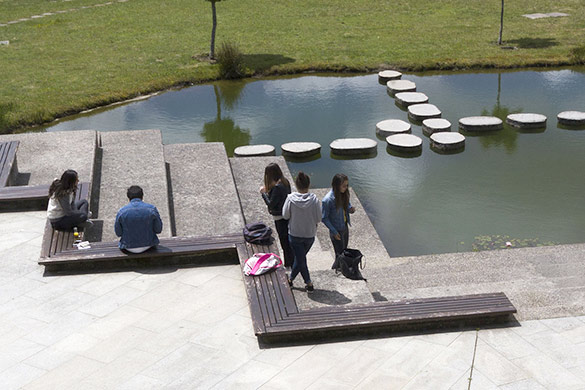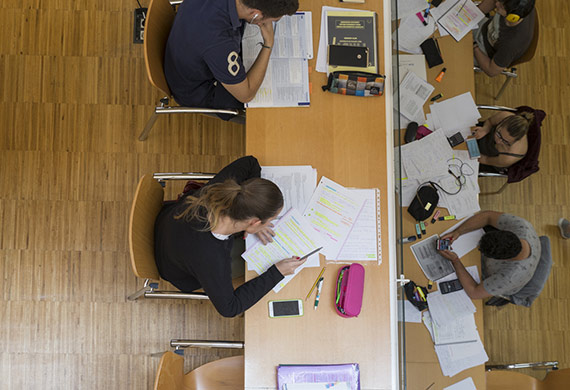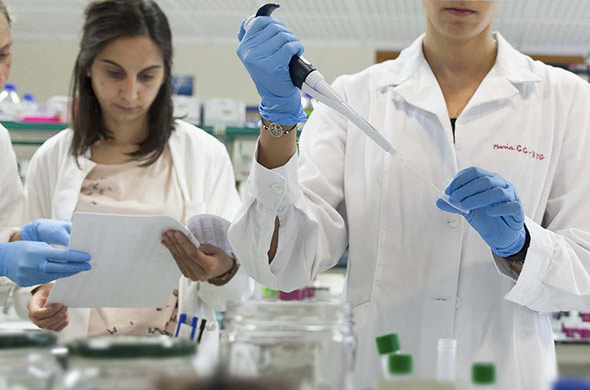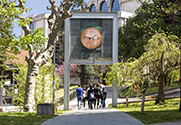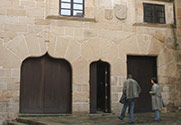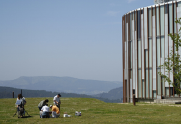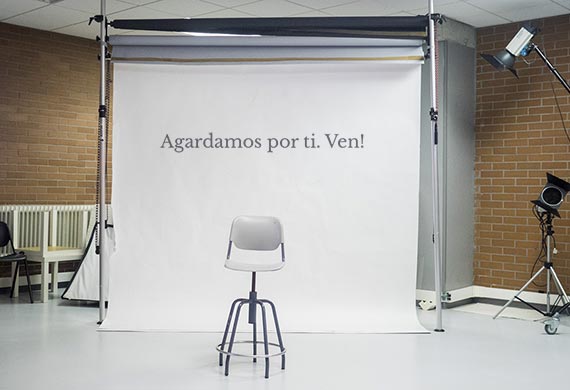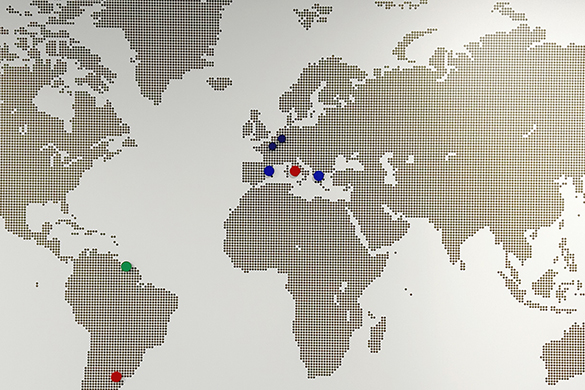
Multilingualism
The Linguistic Internationalisation Plan responds to the decision to follow a strategy to promote multilingualism, associated with the strategic goal of achieving a more international university.
For this reason, one of the main objectives of the Universidade de Vigo is the commitment to enhance collaborations with Portuguese-speaking countries thanks to the historical relations between Galicia and Portugal and the intercontinental territories with Portuguese as official language. In this sense, participation in international fairs in these countries and the signing of collaboration agreements with countries with a migratory tradition are promoted to attract international students.
Linguistic Internationalisation Plan
Structure
The general objective of the Linguistic Internationalisation Plan is to promote the foreign language competence of the university community as a fundamental element of the European higher education policy. To this end, the plan is structured in such a way as to:
- Take into account the current situation of our institution in terms of foreign language competence and the needs of the members of the university community.
- Proactively promote institutional multilingualism and multilingualism.
- Ensure access to foreign language learning, in collaboration with the Language Centre.
- Encourage native speakers of languages other than Galician and Spanish to use their mother tongue, without prejudice to their knowledge of the official languages of the autonomous community of Galicia and the Universidade de Vigo.
- Promote linguistic and cultural diversity and awareness of those languages by all members of the university community.
- Facilitate mobility of students, teaching and research staff, and administrative and service staff.
- Encourage lifelong learning of foreign languages.
Objectives
According to what is set out in the Declaration of Nancy, published by the Council of Europe in 2006, universities should develop appropriate policies enable all European university graduates to:
- Be able to communicate at least in two languages in addition to their own.
- Know how to improve their language skills.
- Be confident and instructed in how to learn a new language when the need or opportunity arises.
- Acquire first-hand experience of working and learning in, and collaborating with, other countries.
- Become familiar with other cultures and acquire intercultural skills.
In order to achieve the desired results and the correct implementation of the Linguistic Internationalisation Plan, the following tools are available:
Language Centre
The Language Centre (known as the Cdl) was founded in 2004 to promote and develop training activities in modern languages, meeting the linguistic needs of the university community and its environment. After more than 15 years of experience, we are a benchmark in language teaching and level accreditation, working in collaboration with the most recognised accreditation entities: ACLES, Cambridge Assessment English, Instituto Cervantes, ETS TOEFL, etc.
The main activity of the Language Centre is specific training of the university community to contribute to the quality of teaching and research and the internationalisation of the Universidade de Vigo.
We invite you to learn more about the Language Centre and the training it offers:
At the same time, the Mutilingualism Area has as its main mission to implement the linguistic internationalisation policy of the university, oby promoting the actions needed to improve competence in foreign languages a,pmg members of the university community, as well as to develop competencies in the university's own languages among our international visitors.
Teaching in English
There are subjects, both undergraduate and master's degrees, that are taught in English. Check the academic year 2024/2025 here:
English Friendly Subjects
The university also has an English Friendly subject programme. Subjects in official UVigo degrees are taught in Spanish and/or Galician, but their teachers make the following commitments:
- Indicate the English Friendly nature of the subject in its teaching guide.
- Translate the teaching guide into English.
- Provide bibliographical materials and references for following up the subject in English, if requested by an international student
- Provide tutorials in English, if requested by an international student
- Design and carry out tests and assessments in English, if requested by an international student
Emilab
EMI (English Medium Instruction) is being adopted by a growing number of universities around the world, including the UVigo. To help with the challenge of teaching in English, the Emilab university community, has a constantly updated online repository available with resources for teachers who teach in English. This is also be useful for writing scientific articles in English and effective interaction in academic and scientific settings.
Higher Education Lecturing Accreditation (HELA)
Higher Education Lecturing Accreditation (HELA) is a test designed at the Universidade de Vigo to ensure teachers have the linguistic skills needed to successfully teach foreign languages. It assesses language proficiency, fluency, communication skills, oral presentation and interaction skills with students.
Comprehensive English Preparation and Accreditation Plan (PIPA)
The Universidade de Vigo, through the office of the Vice-Rector for Internationalisation, has recently launched the Comprehensive English Preparation and Accreditation Plan (known as PIPA) to enable first-year undergraduate students to obtain free accreditation at the B1 level in English.
Stage 1: Level test
Students in the first year of a degree (for the first time) during the academic year can access the Moovi platform. There, they will find a level test which can be taken in one single attempt. The dates available for taking the test are also given on the Moovi platform.
Stage 2: Preparation course for the CertAcles B1 accreditation exam
If the student is selected after taking the level test, they can undertake a blended course to prepare for the CertAcles B1 accreditation exam at no cost. This is a 10-hour course (eight hours of autonomous work to be done whenever suits them on the Moovi learning platform and two hours in the classroom at one of the Universidade de Vigo’s three campuses either in the morning or afternoon. The course lets students familiarise themselves with the various parts of the official exam, which takes place on May 16th 2024.
Stage 3: CertAcles B1 accreditation exam (16th May 2024)
If the student undertakes 85% of the preparation course, they can take the CertAcles B1 accreditation exam at no cost. CertAcles level accreditation is valid throughout the European Higher Education Area, which means that it is accepted by any European university. For further information on the CertAcles exams (descriptions, models, dates, etc.) visit the CertAcles exams page.
Results of the 1st exam call 2024
The following students in the 1st year of a degree at the Universidade de Vigo, on the basis of the result of the English level test taken via the Moovi LMS platform, are entitled to sit a CertAcles B1 accreditation exam.
Enrollment procedure for those selected and on the waiting list:
If you have been selected or appear on the waiting list as a beneficiary of the PIPA Plan, register here (if this is the first time) or enter with your username and password to enrol for the CertAcles B1 level exam preparation workshop. As this plan is 100% funded by the Vice-rector’s office for Internationalisation, the enrolment fee will be €0.
The deadline for enrolment ends on 6th April 2024 at 23.59 h
Remember that to continue being a beneficiary of the PIPA Plan, you must attend 85% of the workshop sessions and take the official CertAcles exam on May 16, 2024.

Further information of interest:
- Linguistic policy framework document for internationalisation of the Spanish university system, passed by the rectors of 76 CRUE universities on 9th May 2017
- ACLES tables
- Tables of the CRUE linguistic round tables
Further information:
Vice-Rectorate for Internationalisation
Edificio Miralles
As Lagoas, Marcosende
36310 Vigo
+34 986 813 587
internacional@uvigo.gal
